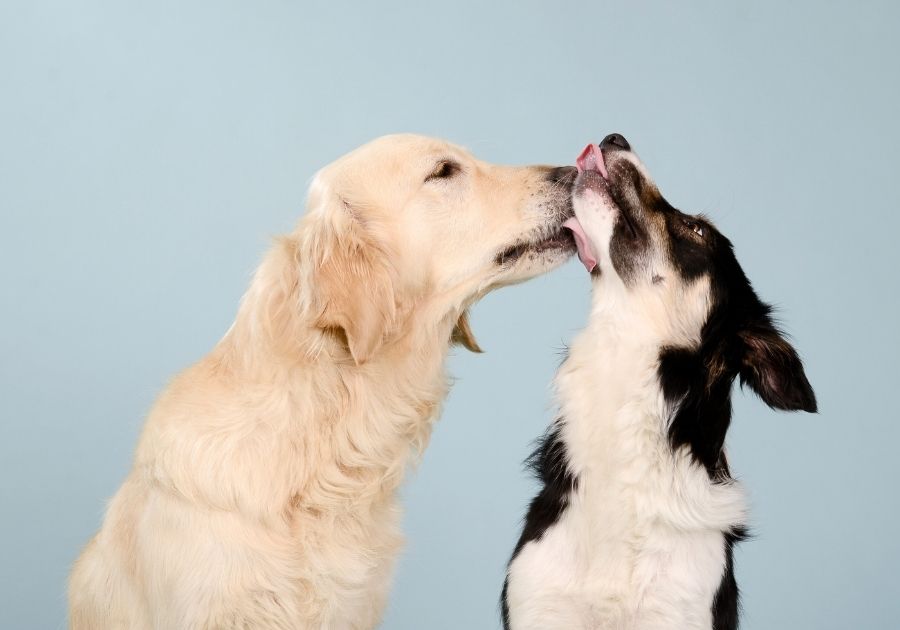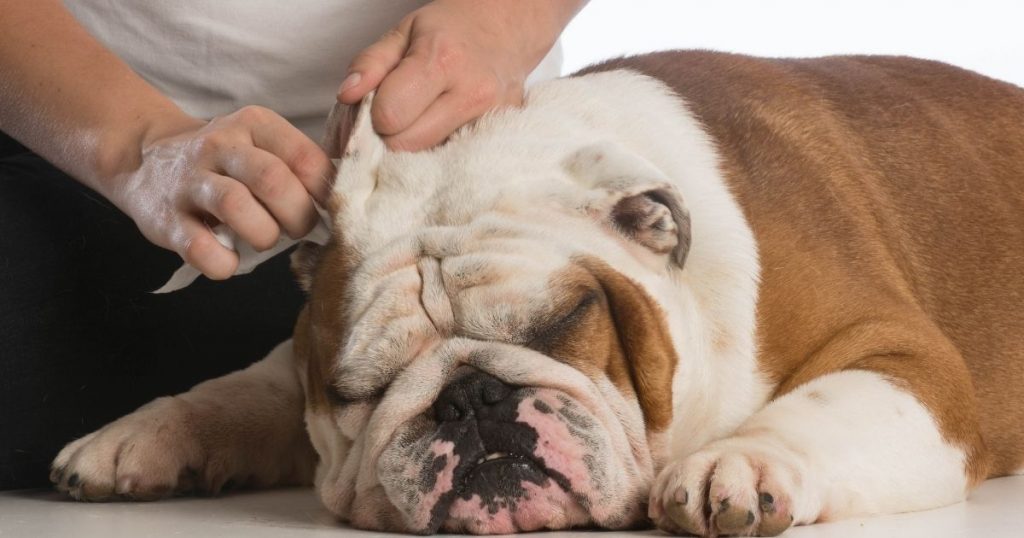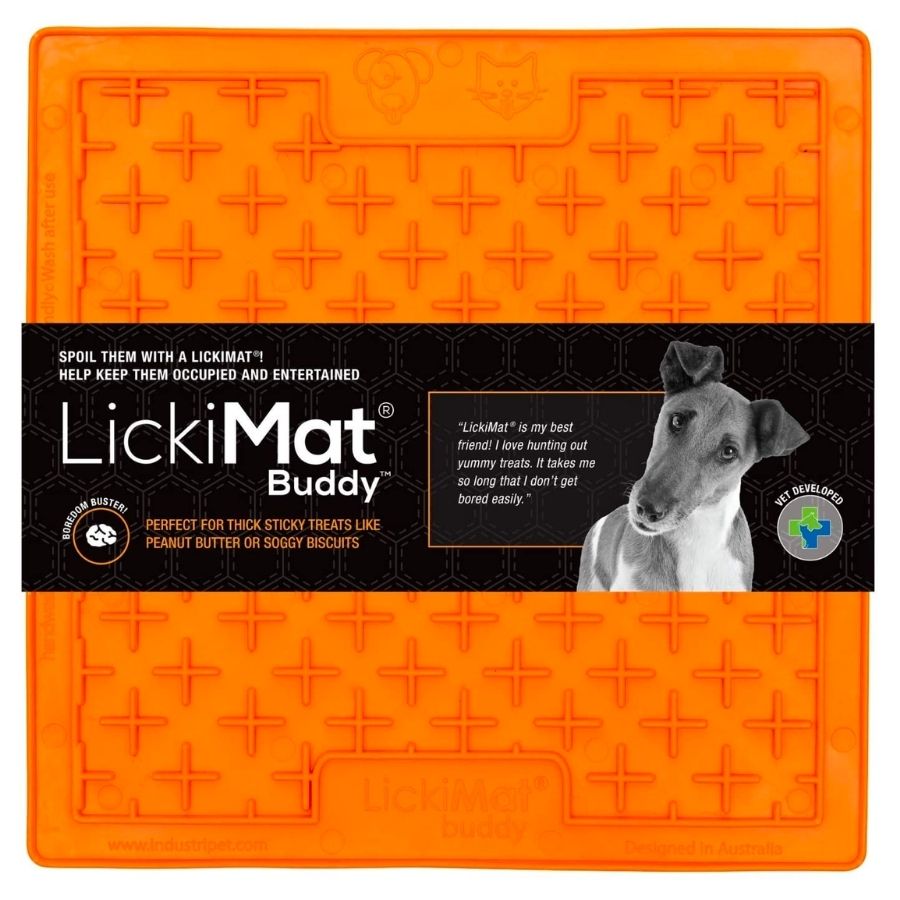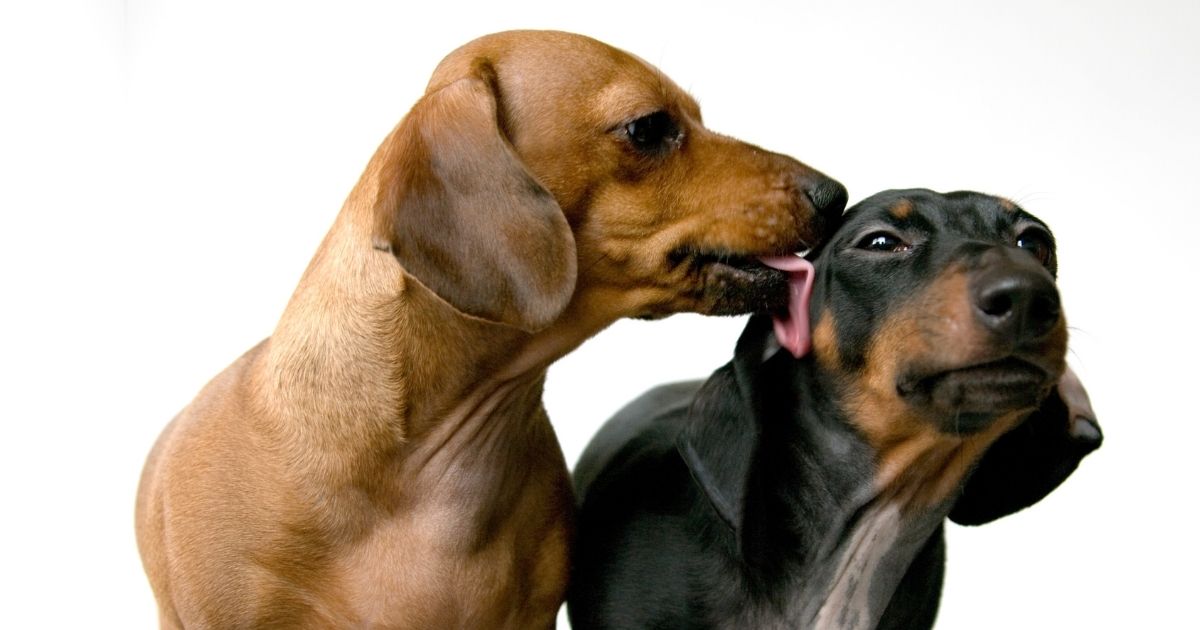Some dogs are super weird. Believe it or not, some really do fancy earwax. Running their tongue all over the grime actually gets them giddy.
If your pooch got you all ew right now, and you’re asking “why do dogs lick each other’s ears?” you’re not alone.
For most dogs, it’s merely a preferred way of saying hello, how have you been? to the other guy. And… Hey! I come in peace.
Veterinary experts estimate that with some breeds, it’s pretty much been ingrained in their DNAs, the queer bonding process of licking ears to exude affability.
There are some more intricate reasons as to why dogs lick other dog’s ears and these we’ve covered in grand detail below:
Why Do Dogs Lick Each Other’s Ears?
Odd as it Seems… Dogs Like the Taste
Grit up. You’ve probably heard a lot of odd stuff over the years but this could very much rank atop.
Thing is, a fair number of canines enjoy the taste of wax and other oddities a dog’s ear canal hosts.
Gross ear infections are actually an answered prayer with these punks. Apparently, ear infections increase the novelty and make them even more enticing.
Is your face all scrounged up right now? ‘Cause ours is.
Remember when you were much younger and you would have your thumb stuck in your mouth all day long?
It’s pretty much the same with dogs and their craving for wax. You’ve probably forgotten, but the saltiness had you so enticed.
Dogs crave salt also, like any other living organism, it’s essential for survival and they naturally are driven to any source of it. However, that’s only a bit of the story.
A more influential reason as to why dogs lust after all that junk has to do with the novelty of it all.
Ear wax mixed with all the accompanying grime (sweat, bodily discharges, and the occasional pus, yuck!) all makes for an exciting treat for these folks.
Licking Ears Can Be a Friendly Greeting and an Appeasement Behavior

Fanciers of ear wax make up just one part of a puzzle. Another bit has to do with the fact that dogs don’t shake paws (would be quite a sight though).
As such, they vibe with the next best thing, nuzzle at the other dawg’s ears to indicate just how peace-loving and affable they are.
Chances are you’ve probably observed your pooch at this.
Perhaps you were walking him in the park and you came across another clan member, your dog would have tittered — if his intentions were to be friendly — and given the other short, brisk ear licks accompanied by other typical submissive behavior.
If you’ve never witnessed such, relax and do not get all geared up the next time you see your pooch walk up to a strange dog and lick its ears straight up.
He’s not looking for trouble but the actual opposite.
It Could Indicate an Ear Infection
Everyone knows about the canine’s inimitable sense of smell.
In fact, It’s made up the core of a remarkable number of animal stories and it’s certainly the prized quality of military and police dogs alike.
And at times, that sense of smell directly influences a dog’s inclination to lick another’s ears.
If the other has an ear infection and your pooch sniffs it out before even the symptoms get obvious, he may get motivated to lick the discharge especially considering that some canines dig the stuff.
If afterward you actually do observe some odd ear growth or that the dog can’t keep his head still due to the irritation from the infection, see a vet before the growth escalates.
Ear Licking Dogs Could Be Bored and Curious

It’s not beyond dogs to get bored and try out new things just for the kicks! Some prefer digging wherever they find a soft ground.
With others though, they go all exploratory and poke their tongues and just about any other suitable body part into another dog’s ears or wherever else they prefer.
For the most part, it’s pretty safe behavior.
However, if the other dog displays signs of inconvenience and can’t stand up to the dominant dog, it’s best you take the steps we’ve outlined later in the article to dissuade him.
Compulsive or Obsessive Licking
OCD is not very common with dogs. However, the ones that do exhibit a licking disorder, may not stop at rubbing their tongues all over you, your house wall, or their bedding but could turn to lick other dogs they run into.
The odd appeal of ear canal gunk could possibly escalate the whole fiasco.
If you’ve got reasonable grounds to suspect that your pooch is suffering from obsessive licking disorder, it’s time to see your vet.
Is Ear Licking Harmful?
Licking a dog’s ear isn’t exactly harmful, but the excess moisture is a direct path to an ear infection.
It would help if you never allowed the behavior to occur without stepping in, and it’s important to tend to the ear immediately to clean and dry it.
If you dry the ear quickly, there should be no harmful side effects at all.
If the Licking Becomes Excessive – Here’s How to Stop it
Depending on whether or not you find ear licking to be an issue or not, you might want to check the behavior and prevent it from getting to be a future problem.
Explained further are the steps to take:
1. Strike Out Medical Undertones

It’s understandable if you decide to look for any medical causes while confronting the rather odd business of ear sniffing.
If it’s a medical issue, definitely no extent of behavioral modification will be effective.
The first thing you do should be to find out if the dog being licked has an ear infection or any other growth in its ear that does not exactly fit into normal acceptable ranges.
The next should be to strike out licking disorders. Here’s where your vet steps in and helps you out.
2. Distract Him with Toys
After you’ve ascertained the licking has got nothing to do with underlying medical issues, you’ll have to drive your pooch’s thoughts away from licking out of boredom.
Animal specialists tag this “behavior redirection”. Put simply, it’s you telling your pet “Licking is a no-no, do this instead.”
Your alternative approach to desensitization should take on a similar form.
For example, there are specially made mats spread all over the web designed to replace canine-to-canine licking.
The Lickimat, for one is a fun alternative to a slow-feeding bowl, which helps to redirect your dog’s licking habit.
Lickimat Classic Dog Slow Feeders for Boredom & Anxiety Reduction

It has been designed in way that when you splatter an edible like peanut butter all over the mat, your pet will be enthralled and would stay to lick everything off.
The design features a variety of crooks and cracks where stuff can get stuck taking up your dog’s time to finish with the same enticement ear licking offers.
With dogs that take to licking, it’s quite the proper stuff.
Remember, when choosing an alternative, factor in activities your pup takes to and look for artificial replacements that are similar.
Be it playing with toys or scrubbing up dirt, give them anything significantly more preferable to ear licking.
3: Teach The “Leave It” Command
Many people report that the previous step is usually enough to stop the odd behavior.
However, just to further certify things, consider training your dog with an explicit command to dictate what’s acceptable and what’s off-limits.
The training will come in great handy often, not only for curbing ear licking but also for other aspects you might need to come off more dominant.
Commonly Asked Questions
Why is my dog licking my other dog’s ears?
Your pet might just really dig the rather odd combination of ear wax and the accompanying salty secretions especially if he has a loose palate.
Dogs naturally are drawn to salt, and as far as they may be concerned, the grime-y canal cocktail from the ear may just be one more treat to enjoy.
Why does my dog lick my ears?
For the most part, dogs lick you to show you how fond of you they are. Little wonder now why many people prefer to think of those rough tongue scrubs as ‘kisses’.
Your pooch can’t take you on a bonding trip to the Eiffel tower, and so they do the next best thing, lick you to show affection.
It’s natural to them, after all it was how mommy groomed them while they were pups.
Should I let my dog lick my ears?
With any kind of ear wound whatsoever, do not allow your dog lick you to reduce the chances of you contracting an infection.
However, if you’re all good and you do not mind having your pooch lick you, give him the greens and allow him to continue.
Trust us when we tell you that your dog grows more fond of you doing this.
Bottom Line
Most dogs that go around licking other dog’s ears see it as a form of greeting, especially when the pair haven’t been around each other for some while.
The other more common reason is that the licked dog has an infection around his ears.
Other dogs without exception are always attracted to and will try to lick the said ear leading to an escalation of the whole thing.
Hopefully, you’ve enjoyed diving a bit deeper into this slightly repulsive topic and you now know a bit more about your pet.
When the situation next comes up, we hope you know better what steps to take.
References: Billings Animal Family Hospital, PetKeen







